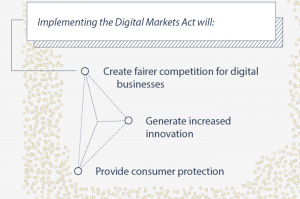EU Digital Policy: How DSA and DMA deserves your full attention!
The EU Parliament has given their final approval on the Digital Services Act (#DSA) and the Digital Markets Act (#DMA) to ensure a safer online environment. It marks the beginning of a promising new relationship between online platforms, users, and regulators.
The Digital Services Act is one of the most important digital policy regulations in Europe. In conjunction with the Digital Markets Act, it becomes a kind of basic law for the Internet which established the principles of what should be illegal offline, should also be illegal online.
The DSA has the goal to create a comprehensive set of new rules for all digital services, that will strengthens the protection of consumers in the digital world and will create an EU-wide, harmonized legal framework for service providers and platforms – through clear rules for dealing with illegal content and more transparency. No matter if it’s for social media, online marketplaces, and other online platforms that operate in the European Union, DSA will introduces new EU-wide obligations which will have a significant impact on a wide range of digital services that connect consumers to goods, services and content, resulting in a safer digital space and fairer online market creation. The DSA also assigns more responsibility to platforms and is intended to ensure that certain content disappears from the Internet more quickly. Such as, hate speech, terror propaganda or even the sale of counterfeit goods. The law is part of a digital pact.
As online services and platforms are an integral part of everyday digital life, the DSA in particular will affect many people directly. They will be better protected online against disinformation, hate speech and counterfeit products. What is illegal offline must also be illegal online and punished accordingly.
The DMA, on the contrary, sets out rules defining and prohibiting unfair business practices by large tech giants such as Google and Facebook with stricter rules. DMA is labelled as important gatekeeper between European businesses and consumers. The fact that the Digital Markets Act is also intended to create more freedom of choice between online services is to be welcomed. Fair competitive conditions and easier market access for small and medium-sized companies are essential for innovations. It remains important to specifically promote the growth of European digital companies, to increase investments and to prevent the shortage of skilled workers and the emigration.

Sources:
